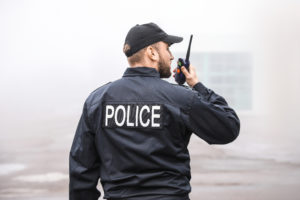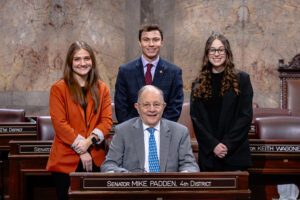Note: The following e-newsletter was sent to Sen. Padden’s subscribers March 7, 2024. To subscribe to Sen. Padden’s newsletter, click here.
Dear friends and neighbors,
This year’s 60-day legislative session is on track to end later today. During the past two days, the Legislature approved final versions of the state supplemental operating, capital and transportation budgets. These spending plans make adjustments to the original two-year budgets enacted by the Legislature last spring. There is more information about the three budgets later in this e-newsletter.
Last Monday, a very historic event happened when the Legislature passed three initiatives that were sent to us in January.
I-2113 – restoring police pursuits
The Senate voted 36-13 to pass Initiative 2113, which would fully restore the ability of Washington police officers to engage in vehicular pursuits. The House then approved it 77-20.
I-2113 is a major step toward making Washington communities safer and reversing the growing crime problem in Washington.
Among the many problems plaguing Washington now, crime is perhaps the greatest concern for citizens and communities. In fact, our state has reached a crisis point because of skyrocketing crime.
Thanks to state laws like the one passed by majority Democrats in 2021 that placed tight limits on when law-enforcement officers can engage in vehicle pursuits of suspects, criminals have become more emboldened. They are acting in a more brazen manner as they commit crimes. The result is many people throughout Washington have been victims of auto theft, retail theft, burglary and other property crimes. Making matters worse, many auto thieves use the stolen vehicles to smash into “pot shops” to steal cash, or use these cars as battering rams to break into other stores to steal merchandise.
Fortunately, once I-2113 goes into effect on June 6, law-enforcement officers will once again be able to pursue suspects instead of helplessly watching them drive away.
According to the Washington State Patrol, between 2014 and 2020 an average of 1,200 suspects per year fled from police. In 2022, after the pursuit standard was changed to probable cause, 3,100 suspects fled — an increase of more than 150%. Before the change in the pursuit law, the statewide record for stolen cars in a single year was 30,000. That record increased to nearly 47,000 stolen vehicles in 2022. Washington is now fourth in the U.S. for auto thefts per capita.
As I noted during my floor speech in favor of this initiative, it’s not only the owner of the vehicle that suffers, it’s the victims of all the crimes that are committed with these stolen vehicles. Some of these crimes have led to the deaths of our citizens.
Many sheriffs and police chiefs throughout Washington have voiced their frustration about the tighter pursuit restrictions, to little avail. Although the Legislature last year passed a law restoring some ability for law-enforcement officers to pursue suspects, it was still far short of the pre-2021 police-pursuit policy. It is good to see that the state’s police pursuit law will return to where it was thanks to I-2113.
Several articles were published by Spokane-area media outlets about the Legislature passing I-2113, including stories by the Washington State Standard/Spokane Radio, KXLY-TV , KHQ-TV and Seattle-based Crosscut.
The other two initiatives that were approved by the Legislature on Monday are:
- Initiative 2081, which would give parents the right to review K-12 instructional materials and require parental notification of school-provided medical services. It was passed by the Senate 49-0. The House later approved it 82-15.
- Initiative 2111, which would ban any state or local income tax in Washington. The Senate approved I-2111 on a 38-11 vote. The House then passed it 76-21.
I voted for all three measures. As is the case with I-2113, Initiative 2081 and Initiative 2111 will go into effect June 6.
If you have questions about how to participate in state government this year or thoughts to share on anything in this e-newsletter, please give me a call or send me an email.
Thank you, as always, for the honor of representing you in Olympia!
Best Regards,
Senator Mike Padden
Legislature takes no action on three other initiatives
The Olympics appear to the north during a recent sunny morning at the Capitol.
The other three initiatives sent to the Legislature this session will not be passed by the Legislature before we adjourn and go home. They are:
- I-2109, which would repeal the state capital-gains income tax that was passed by the Democrat-controlled Legislature in 2021.
- I-2117, which would repeal the state’s costly climate policy that was enacted by majority Democrats in 2021 and took full effect early last year.
- I-2124 , which would allow individuals to opt out of the mandatory payroll tax for the state-run long-term care program called “WA Cares.”
These three initiatives did not even receive public hearings this session, which was very disappointing. Had they reached the Senate floor for votes, I would have voted for each of them.
Since the Legislature did not pass these three initiatives this session, they automatically will be placed on the statewide ballot this fall for Washington voters to decide.
4th District projects funded in supplemental capital budget
The Legislature on Wednesday unanimously approved the compromise version of this year’s supplemental state capital budget. As was the case with the Senate version of the capital budget, this final version includes funding for several projects in the 4th District:
- $975,000 to help with the recovery from last summer’s Oregon Road wildfire near the community of Elk, as well as the Gray fire near Medical Lake. The wildfire-recovery effort will be administered by the Spokane Conservation District.
- $4.8 million to replace the boiler at the Kaiser Aluminum plant in Spokane Valley. This is about meeting state emission requirements, so this funding is a huge plus for Kaiser and its over 1,100 workers. Kaiser is matching the capital budget funds.
- $2 million for Seven Nations Healing Lodge youth expansion.
- $1 million for Broadway Senior Housing.
- $300,000 in phase two funding for Spokane Scale House Market in Spokane Valley. The 2023-25 budget included $750,000 for Spokane Scale House Market, located at Spokane Conservation District.
- $258,000 for a playground at The Intersection Preschool and Childcare on North McDonald Road.
- $150,000 for the city of Spokane Valley Cross Country Course.
- $32,000 for the West Valley Centennial Middle School baseball field’s fences and dugout.
It’s good to see taxpayers’ money coming back as investments in local projects.
Supplemental transportation budget includes 4th District projects
Earlier today, the Legislature passed this year’s state supplemental transportation budget. I voted for this budget, as it provides funding for several projects in the 4th District, including:
- $24 million for improvements to Interstate 90 improvements to interchanges and nearby roads.
- $10.4 million for Spokane Transit Authority’s Argonne Station park-and-ride.
- $10.348 million for corridor design work on an Interstate 90 project between Sullivan Road and the Idaho state line.
- $6 million for the Barker Road/Burlington Northern Santa Fe Railroad grade separation project.
- $6 million for the Bigelow Gulch/Forker Road realignment project.
- $5.8 million for the Millwood Trail project from Spokane Community College to Fancher Road. The overall plan is to eventually connect this new trail with the trail that starts just north of the West Valley High School sports fields in Millwood and then to the Centennial Trail.
Supplemental operating budget funds training for corrections officers
The Legislature today also approved the state supplemental operating budget. It provides funding to expand the state Corrections Academy so it can add additional classes. I’m working with state officials so that part of that funding can go to the new Spokane County Sheriff Regional Training Center, near Fairchild Air Force Base.
Legislature keeps Padden policy in bill passed to combat impaired driving
At a time when traffic deaths in Washington have reached their highest point in over 30 years, the Legislature took a major step toward addressing this serious problem last night by passing House Bill 1493, a measure that would combat impaired driving.
The passage of this bill is a major step toward making our roads and highways safer. It includes provisions that will keep more repeat impaired drivers off the road.
HB 1493 includes policy that I have proposed the past four years. An amendment approved by the Senate last week added language from Senate Bill 5032, a measure that I introduced that would expand the period for reviewing prior convictions of impaired driving to 15 years, from the 10 years now in state law, when determining whether a new offense of impaired driving is charged as a felony.
The policy language from SB 5032 that is now part of HB 1493 also would increase the penalty to a felony offense, rather than a gross misdemeanor, for any person who has three or more prior DUI offenses within that “lookback” period.
Washington has seen a significant increase in traffic deaths over the past few years. Drunken driving and drug-impaired driving, especially by repeat offenders, are two leading causes. House Bill 1493 will help remove the most dangerous drivers from our roads and highways and get them into treatment or they will be held accountable by the state criminal justice system. This bill provides good balance, as it is strong on treatment while also being strong on accountability.
Many traffic fatalities in the state involve drivers who have had as many as eight DUI offenses, but the current 10-year lookback period is not long enough to allow the state to impose stronger punishment against such offenders.
According to the Washington Traffic Safety Commission, there were 740 traffic deaths in the state in 2022 (the highest in over 30 years), including 389 fatalities involving drug- or alcohol-impaired driving. There were 674 traffic deaths in 2021, including 345 fatalities involving impaired driving. In 2020, Washington had 574 traffic fatalities, including 282 involving impaired driving.
The final version of the impaired driving measure, HB 1493, was passed last night by the House on a 69-27 vote. The Senate approved it 49-0 on February 29. It now goes to Governor Jay Inslee for final consideration.
Legislature OKs pollinator bill requested by Mount Spokane HS student
Last fall, Mount Spokane High School student Julia Costello approached me about helping her with part of her pollinator project, which she has been doing to earn a major Girl Scout award.
What began as her request became Senate Bill 5934, a bipartisan measure to promote the use of pollinator-friendly shrubs or bushes in landscaping. It was passed by the Legislature this week and now goes to the governor for final consideration.
Pollinators, including bees and butterflies, play a very important role in the pollination of crops, contributing to the production of fruits, vegetables and nuts. Seventy-five percent of the world’s food supply depends on pollinators. They play a vital role in sustaining agriculture. Taking steps to protect and enhance pollinators is very important to both agriculture and the environment.
It was an honor to work with Julia on this bill and to help her as she works to finish requirements to earn the Gold Award, which is equivalent to earning the Eagle Scout award as a Boy Scout. One of Julia’s Gold Award requirements is working with a legislator on sponsoring a bill. Julia made a strong case why improving pollinators’ habitat is important and beneficial. I’m pleased the Legislature has passed her bill.
Julia’s testimony in favor of the bill during its public hearing before the House Local Government Committee last month can be viewed here.
Spokane Conservation District Director Vicki Carter sent a letter to Padden in January in support of the proposal. Part of Carter’s letter reads: “Pollinators, including bees, butterflies, and other insects, play a fundamental role in the pollination of crops, contributing to the production of fruits, vegetables, and nuts. Their vital role in sustaining agriculture cannot be overstated, as approximately 75% of the world’s food crops depend on pollinators for successful reproduction. Therefore, taking steps to protect and enhance pollinator populations is essential for ensuring food security and promoting sustainable agricultural practices.”
Under the bill, a local government may encourage but need not require applicants for project or commercial-building permits to include pollinator-friendly plants in any landscaped area.
Legislature OKs second Padden bill removing red tape from construction of smaller condominiums
For the second year in a row, the Legislature has unanimously approved a bill of mine that helps encourage home ownership in Washington by making it easier to construct smaller condominium buildings. It now goes to the governor.
Senate Bill 5792 would exclude buildings with 12 or fewer units that are no more than three stories high from the definition of “multiunit residential building” if one story is utilized for above- or below-ground parking or retail space.
This bill builds on last year’s efforts to have more housing options for Washington’s middle class. The law created last year by Senate Bill 5058 exempts buildings with 12 or fewer units that are no more than two stories high from the definition of “multiunit residential building.”
When SB 5792 received a public hearing in the House Housing Committee last month, Spokane Valley Mayor Pam Haley and an official with the Building Industry Association of Washington testified in favor of it. During its public hearing in the Senate Law and Justice Committee early this session, Spokane City Council President Betsy Wilkerson and Spokane Valley City Council Deputy Mayor Rod Higgins testified in support of the bill.
Condominiums provide an affordable path to homeownership for first-time homebuyers. The combination of SB 5058 and this year’s new bill should result in more homeownership in our state. Washington has one of the lower homeownership rates in the nation, and both SB 5792 and last year’s condo-building law can help our state address this problem. These smaller condominiums would still have the same building requirements that a townhouse or single-family house would have.
Farewell to ‘Team Padden’ this year
A big thank-you goes to my Senate office staff this session for all of its terrific work, especially in responding to constituents’ emails and phone calls. Earlier this week, we gathered at my Senate floor desk for a group photo. From left to right are legislative assistant Annalise Hemingway, session assistant Ethan Mettlin and session intern Vandee Pannkuk. Annalise will continue as my legislative assistant and will work in our 4th District office during the interim months.
Starting Wednesday, March 13, we will be back in the district office. The phone number is 509-921-2460. The office address is 5105 E. Third Ave., Ste. 102, Spokane Valley, WA 99212.
Contact us!
If you have a question or concern about state government, please do not hesitate to contact our office. During the session we are conducting business from our Senate office in Olympia. We are here to serve you!
Phone: (360) 786-7606
Olympia Office: 215 Legislative Modular Building, Olympia, WA 98504-0404
Email address: Mike.Padden@leg.wa.gov
PLEASE NOTE: Any email or documents you provide to this office may be subject to disclosure under RCW 42.56. If you would prefer to communicate by phone, please contact Sen. Padden’s Olympia office at (360) 786-7606.
To request public records from Sen. Padden, please contact Randi Stratton, the designated public records officer for the Secretary of the Senate and Senate members.


















